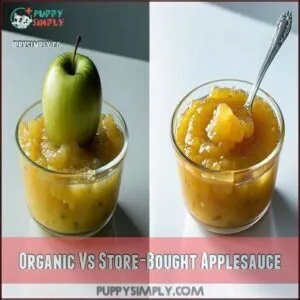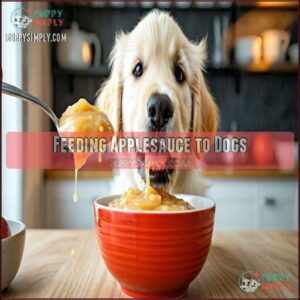This site is supported by our readers. We may earn a commission, at no cost to you, if you purchase through links.
 Yes, dogs can eat applesauce, but make sure it’s plain, unsweetened, and free of harmful additives like xylitol or artificial sweeteners.
Yes, dogs can eat applesauce, but make sure it’s plain, unsweetened, and free of harmful additives like xylitol or artificial sweeteners.
Applesauce can be a tasty treat for your pup, offering fiber and vitamins like A and C, which support digestion and immune health.
However, moderation is key—too much can upset their stomach or add unnecessary sugar to their diet.
Always check the label on store-bought options, or better yet, make a simple homemade version without added sugar or spices.
When served safely, applesauce can be a fun addition to a healthy diet.
Curious about serving ideas? Read on!
Table Of Contents
- Key Takeaways
- Can Dogs Eat Applesauce
- Is Applesauce Good for Dogs
- Applesauce Health Benefits
- Choosing Safe Applesauce
- Preparing Applesauce for Dogs
- Feeding Applesauce to Dogs
- Applesauce for Canine Health
- Applesauce for Puppies and Seniors
- Consulting a Vet on Applesauce
- Frequently Asked Questions (FAQs)
- Is applesauce good for dogs?
- How much applesauce can I feed my dog?
- Is unsweetened applesauce healthy?
- How much applesauce can a dog eat?
- How much applesauce can I give my dog?
- Does applesauce help a dog’s stomach?
- Is Mott’s applesauce safe for dogs?
- Can my dog have applesauce with cinnamon?
- Is cinnamon applesauce safe for dogs?
- Can dogs with diabetes eat applesauce?
- Conclusion
Key Takeaways
- Stick to plain, unsweetened applesauce without harmful additives like xylitol to keep it safe for your dog.
- Feed small portions, about one to two spoonfuls, as an occasional treat to avoid digestive issues or weight gain.
- Applesauce provides fiber, vitamins A and C, and antioxidants, supporting your dog’s digestion, immunity, and overall health.
- Avoid added sugars, preservatives, or flavored varieties, and always check with your vet if you’re unsure about introducing it to your dog’s diet.
Can Dogs Eat Applesauce
Yes, dogs can eat applesauce as long as it’s plain and free from added sugars or harmful ingredients.
Dogs can enjoy applesauce as a tasty treat—just make sure it’s plain, unsweetened, and free from harmful additives.
It can be a healthy, occasional treat that provides fiber, vitamins, and antioxidants to support your dog’s overall well-being.
Nutritional Benefits of Applesauce
Applesauce benefits dogs by delivering a Vitamin Boost, Fiber Content, and Antioxidant Power.
Packed with vitamins A and C, it supports Bone Health, skin, and immunity.
The high fiber serves as a Digestive Aid, promoting regularity and easing stomach troubles.
Applesauce’s nutritional value, including calcium and phosphorus, helps strengthen teeth, bones, and nails, keeping your pup active and healthy with Antioxidant Power.
Risks of Feeding Applesauce to Dogs
Feeding applesauce to dogs carries risks if not done cautiously.
Here’s what to watch for:
- Sugar Content: High sugar levels in some applesauce can lead to diabetes, obesity, and dental issues.
- Toxic Additives: Xylitol, a common sweetener, is toxic to dogs.
- Digestive Issues: Sweetened or additive-rich varieties may cause diarrhea or upset stomachs.
Always choose plain, unsweetened options.
Importance of Moderation in Feeding Applesauce
Moderation is key when offering applesauce to dogs.
Stick to a small applesauce serving size, like one or two spoonfuls, ensuring it’s a treat and not a daily snack.
Portion control prevents excess calorie intake, supporting dog digestive health and managing obesity risks.
Frequency matters—keep treats like applesauce for dogs under 10% of their diet to avoid applesauce side effects, and remember that moderation is crucial in this context.
Is Applesauce Good for Dogs
Yes, applesauce can be good for dogs when prepared and served correctly.
This simple treat holds nutritional value and supports overall canine health. To maximize its benefits, stick to unsweetened, natural options with no harmful additives.
Here’s why it’s a great addition:
- Nutritional Boost: Applesauce benefits include fiber, Vitamin A, and Vitamin C, which promote dog digestive health, a shiny coat, and strong immunity.
- Safe Consumption: Plain, additive-free applesauce is gentle on your dog’s stomach and fits a balanced diet.
- Dietary Addition: Moderation is key—serve as an occasional treat or mix into dog food for variety.
- Recipe Variations: Homemade applesauce gives you full control over the ingredients, ensuring it’s safe and nutritious for your furry friend.
Applesauce Health Benefits
Applesauce can offer your dog a healthy dose of fiber, antioxidants, and essential vitamins like A and C. These nutrients support digestion, a strong immune system, and overall well-being.
Fiber and Antioxidant Content
You mightn’t think fiber and antioxidant benefits matter to your dog, but they do.
Applesauce is packed with fiber, aiding digestion and keeping things moving smoothly.
Antioxidants, on the other hand, help combat free radicals, supporting overall health.
As a natural pectin source, applesauce also soothes sensitive tummies, making it a great choice for keeping your pup’s digestion happy and supporting their overall health.
Vitamin a and C Benefits
Packed with vitamins A and C, applesauce supports your dog’s health in surprising ways.
Vitamin A promotes skin health, coat quality, and even joint health, while vitamin C provides an antioxidant boost to strengthen immune support.
Adding unsweetened applesauce to their diet enhances applesauce nutritional value, giving your pup a tasty way to enjoy better dog health without unnecessary additives or sugars.
For ideal development, consider that puppies need vitamins to support their growth and overall well-being.
Digestive Health and Immune System
Applesauce supports dog digestion thanks to pectin benefits, which help soothe applesauce dog diarrhea and constipation.
Fiber digestion aids the gut microbiome by promoting probiotics, boosting gastrointestinal health.
Its high water content helps with hydration, while vitamins improve absorption, and by strengthening immunity, applesauce acts as one of nature’s immune boosters for dogs, keeping their digestion smooth and their defenses strong.
Choosing Safe Applesauce
When choosing applesauce for your dog, stick to unsweetened, organic options or make it at home to guarantee it’s free from harmful additives.
Always check the label for added sugars, preservatives, or artificial ingredients that could affect your dog’s health.
Organic Vs Store-Bought Applesauce
Organic applesauce is a safer choice for dogs. It’s free of harmful pesticides, synthetic additives, and preservatives.
Store-bought options often include unwanted ingredients like added sugars, which can harm pets. While organic is pricier, its purity justifies the cost.
Alternatively, homemade applesauce offers full control over ingredients, ensuring unsweetened applesauce fits your dog’s needs. Always check applesauce ingredients carefully to ensure they are safe!
Avoiding Added Sugars and Preservatives
Store-bought applesauce often hides ingredients like sugar and preservatives that can harm your dog.
Reading labels is critical to avoiding long-term effects like obesity or diabetes.
Stick to unsweetened applesauce for dogs, ensuring it’s free of hidden ingredients.
Understanding the dog food ingredients can help with making informed decisions about your pet’s treats.
Homemade applesauce gives you full control, letting you choose natural alternatives without risks.
Keep it simple—your pup’s health deserves it!
Preparing Applesauce for Dogs
Making applesauce for your dog is simple and guarantees you’re giving them a safe, healthy treat.
Start by using fresh, peeled apples, removing the cores and seeds completely to avoid harmful toxins.
Homemade Applesauce Recipe
Creating a homemade applesauce recipe for dogs is simple and rewarding.
Use dog-safe ingredients and cook with care.
Here’s how:
- Choose any apple variety (organic preferred), peel, core, and chop.
- Cook with water using any method: Instant Pot, slow cooker, or stovetop.
- Blend techniques vary; puree until smooth.
Consider using specialized products for proper preparation.
Store properly, and you’ve made a healthy treat!
Removing Seeds and Stalks for Safety
When making applesauce for dogs, always remove seeds and stalks.
Apple seeds contain amygdalin, which can lead to cyanide exposure, while stalks pose choking hazards.
Safe preparation means guaranteeing dog-safe ingredients every time.
Here’s a quick guide:
Unsafe Part Risk
**Why Remove?
| ** | ||
|---|---|---|
| Seeds | Amygdalin toxicity | Prevent cyanide exposure |
| Stalks | Choking hazard | Guarantee safe consumption |
| Cores | Digestive blockages | Avoid intestinal issues |
| Pits (if any) | Obstruction risk | Prevent emergencies |
| Rotten Spots | Bacteria exposure | Support dog food safety |
Storage and Serving Tips
To store applesauce for your dog, use airtight containers to keep it fresh. Freeze applesauce in ice cube trays for easy portioning and summer treats.
Consider using specialized freezer trays for easy removal. Stick to small serving sizes to avoid overfeeding.
Aim for dietary integration by adding it sparingly to dog treats or meals. Monitor response after serving to confirm it suits your dog’s digestion.
- Freeze in cubes for portion control.
- Use clean, airtight containers for freshness.
- Start small to gauge your dog’s preference.
- Add sparingly to dog treats or food bowls.
Feeding Applesauce to Dogs
When feeding your dog applesauce, start with small amounts to see how they respond. Stick to plain, unsweetened varieties and always monitor for any signs of discomfort or allergic reactions.
Serving Guidelines and Moderation
When serving applesauce to your dog, stick to small amounts—one to two spoonfuls for a medium-sized dog.
Treat percentage matters; applesauce should be no more than 5-10% of their daily intake.
Feed it occasionally, not regularly, to maintain balance in their dog diet.
Freezing applesauce in portions also makes it a cooling dog treat for warm days.
Monitoring for Signs of Discomfort
When dogs eat applesauce, keep an eye out for digestive changes, like diarrhea, constipation, or vomiting.
Check stool consistency and watch for behavioral shifts or appetite changes. A drop in energy levels might signal discomfort.
If you’re wondering, "**Is applesauce safe?
**" — small amounts usually are, but monitor closely.
Discontinue if symptoms persist, and consult your vet immediately to address any digestive changes or other issues, ensuring the dog’s health and well-being, especially if you notice a drop in energy levels.
Avoiding Overconsumption and Allergic Reactions
Even with its benefits, applesauce should be given with care. Overeating can lead to digestive issues or weight gain, especially for dogs with dietary restrictions or breed predispositions.
Introduce applesauce slowly to monitor for adverse symptoms like vomiting or itching. Apples offer benefits like hydration and nutrients, but moderation is key.
To ensure safe consumption, follow these guidelines:
- Stick to small portions, around one tablespoon.
- Watch for allergic reactions or sensitivities.
- Avoid daily feeding.
- Consult your vet for dosage concerns.
Applesauce for Canine Health
You can use applesauce to support your dog’s overall health, thanks to its nutrient-rich ingredients like fiber, vitamins, and antioxidants.
When given in moderation, it can help with digestion, improve immunity, and even promote a shiny coat.
Relieving Diarrhea and Constipation
When your pup’s tummy troubles strike, applesauce can help. Its soluble fiber, like pectin, absorbs water, easing diarrhea and aiding constipation.
Add a spoonful to support gastrointestinal health safely. Use the BRAT diet (bananas, rice, applesauce, toast) for calming digestion, but stick to plain applesauce in small amounts.
Always follow dosage guidelines and consult your vet for proper care.
| Beneficial Component | Effect on Digestion | Example Use | Precaution |
|---|---|---|---|
| Pectin (Fiber) | Regulates stool | Eases diarrhea | Avoid excess |
| Soluble Fiber | Absorbs water | Prevents constipation | Introduce gradually |
| High Water Content | Aids hydration | Relieves upset stomach | Check for allergies |
| BRAT Diet | Calms digestion | Helps gastrointestinal health | Consult vet |
Supporting Dental Health and Hygiene
Applesauce can subtly support your dog’s dental health when offered sparingly.
Its natural texture may gently massage gums, helping with circulation and breath improvement. While it won’t replace brushing, it might aid plaque reduction and prevent tooth decay.
For a more thorough approach, consider specialized dental chews.
- Gum massage: Soft applesauce texture stimulates healthy gums.
- Plaque reduction: Encourages light cleaning.
- Breath improvement: Neutralizes minor odors.
- Chewing benefits: Pairs great in frozen dog treats.
Using Applesauce as a Remedy
If your dog’s dealing with an upset stomach, applesauce can be a gentle remedy.
It’s part of the trusted BRAT diet—bananas, rice, applesauce, toast—offering diarrhea relief and helping with constipation.
Stick to unsweetened varieties for safety, and always consult your vet for dosage guidelines.
Remember, small amounts work best to ease your pup’s digestive issues without adding discomfort.
Applesauce for Puppies and Seniors
Puppies and senior dogs have sensitive stomachs, making it essential to introduce foods like applesauce carefully.
Stick to small amounts of plain, unsweetened applesauce, and consult your vet to confirm it fits their dietary needs.
Feeding Applesauce to Puppies Safely
Introducing applesauce to puppies requires care and preparation.
Stick to safe ingredients, like unsweetened homemade applesauce, and focus on portion control.
Here are key tips:
- Consult your vet before adding applesauce.
- Start with a teaspoon to monitor puppy digestion.
- Avoid added sugars or spices.
- Use apples as the sole ingredient.
- Watch for any allergic reactions to ensure the puppy’s health and well-being.
Age and Breed Considerations
Not all dogs react the same to applesauce, as breed sensitivity, age, and allergies influence tolerance.
Puppies can eat applesauce once on solid food, while senior digestion requires gentle portion sizes.
Adjust dietary amounts based on your dog’s age and size.
Remember, applesauce isn’t a replacement for balanced meals—offer it occasionally to support senior dog care or young pups.
Veterinary Guidance for Puppy Owners
You’ve got a new puppy, and their tiny, sensitive stomach needs extra care.
Before introducing applesauce, check with your veterinarian to confirm it fits their dog nutrition plan.
Breed-specific needs vary, so portion control tips are key.
Stick to vet-approved brands or homemade recipes for safe, occasional dog treats.
Protect your puppy’s health with thoughtful, guided choices.
Consulting a Vet on Applesauce
Before offering applesauce to your dog, it’s essential to check with your veterinarian to confirm it’s a safe addition to their diet.
Your vet can provide guidance suited to your dog’s specific health needs and dietary restrictions.
Importance of Veterinary Approval
Before making dietary changes, including vet-approved applesauce, talk to your veterinarian. Every dog is unique, and factors like breed predispositions or specific conditions matter.
Here’s why you should seek veterinary advice:
- Check for allergies or individual sensitivities.
- Confirm the proper dosage concerns.
- Assess if your dog’s health suits applesauce.
- Detect underlying issues first.
- Confirm it’s safe and nutritious.
Regular veterinary check-ups can also help identify underlying health concerns early on.
Factors to Discuss With Your Vet
Talk to your veterinarian about applesauce dogs can enjoy safely.
Discuss breed predispositions, specific conditions like obesity or diabetes, and dog allergies.
Allergy testing may help determine suitability, while quantity guidelines guarantee moderation.
Always prioritize dietary integration to prevent imbalances.
| Topic | Why It Matters | What to Ask | Importance |
|---|---|---|---|
| Breed Predispositions | Some breeds tolerate applesauce better | Is it safe for my dog’s breed? | Certain breeds have unique dietary needs. |
| Specific Conditions | Health issues affect tolerance | Can dogs have applesauce with health concerns? | Conditions like obesity limit applesauce suitability. |
| Allergies | Dogs may react differently | Should we do allergy testing? | Prevents adverse reactions. |
| Quantity Guidelines | Overfeeding impacts health | What’s a safe serving size? | Moderation avoids digestive upset. |
Personalized Advice for Your Dog’s Diet
Tailoring applesauce to your dog’s unique needs depends on factors like dietary restrictions, activity levels, and health conditions.
Here’s what to discuss with your vet:
- Your dog’s breed specifics and size.
- Whether dogs can have unsweetened, dog-friendly applesauce safely.
- Any allergy considerations affecting pet nutrition.
- Impact on existing health conditions.
- Appropriate serving sizes based on activity levels.
The discussion with your vet should cover these key points to ensure the applesauce is given safely and effectively, considering all aspects of your dog’s health and well-being.
Frequently Asked Questions (FAQs)
Is applesauce good for dogs?
Imagine a health boost wrapped in sweetness—applesauce can be great for dogs if fed plain and unsweetened.
Its vitamins, fiber, and antioxidants support digestion and immunity, but avoid added sugars or artificial ingredients for safety, ensuring the applesauce remains a healthy option.
How much applesauce can I feed my dog?
You can feed your dog one or two spoonfuls of unsweetened applesauce as an occasional treat.
Keep portions small—treats like this should never exceed 10% of your dog’s daily calorie intake.
Is unsweetened applesauce healthy?
Unsweetened applesauce is a nutritional goldmine for dogs, packed with fiber, vitamin C, and antioxidants.
It aids digestion, supports immune health, and keeps their coat shiny.
Just keep portions small to avoid stomach upset, as this is crucial for maintaining the benefits of unsweetened applesauce.
How much applesauce can a dog eat?
Stick to small portions—one to two spoonfuls for medium-sized dogs.
Applesauce should be an occasional treat, not a daily habit.
Monitor your dog’s reaction and make certain it’s plain, unsweetened, and free of harmful additives.
How much applesauce can I give my dog?
You can safely give your dog one to two spoonfuls of unsweetened applesauce as an occasional treat.
Just keep it moderate to prevent digestive upset, and always check with your vet for personalized advice!
Does applesauce help a dog’s stomach?
Yes, applesauce can help settle your dog’s stomach, especially during mild stomach upset or diarrhea.
Its pectin content absorbs excess water and improves digestion, but always opt for plain, unsweetened applesauce and offer it sparingly.
Is Mott’s applesauce safe for dogs?
Mott’s applesauce isn’t the best choice for dogs because it often contains added sugars or preservatives that can harm them.
Instead, opt for plain, unsweetened applesauce without any additives to keep your pup safe.
Can my dog have applesauce with cinnamon?
Your dog can enjoy applesauce with a pinch of cinnamon, but keep it unsweetened and free of additives.
Cinnamon can be safe in moderation, but too much might irritate your dog’s stomach.
Always start small!
Is cinnamon applesauce safe for dogs?
Cinnamon applesauce can be safe if unsweetened and free of artificial additives, but only give your dog a small taste.
Avoid powdered cinnamon clumps, and always check with your vet before introducing new treats.
Can dogs with diabetes eat applesauce?
Dogs with diabetes can eat unsweetened applesauce in moderation, but you’ve got to be cautious.
Avoid added sugars and consult your vet first, as even natural sugars can impact blood sugar levels.
Always follow their guidance, and be aware that even natural sugars can have an effect.
Conclusion
It’s funny how something as simple as applesauce can spark so many questions, isn’t it?
Yes, dogs can eat applesauce, but stick to plain, unsweetened types without harmful ingredients.
When served in moderation, it provides fiber, vitamins, and a tasty boost to their diet.
Always check labels or make your own to keep it safe. Remember, your dog’s health comes first, so monitor their reaction and consult your vet if needed.
Applesauce can be a fun, healthy treat!

















